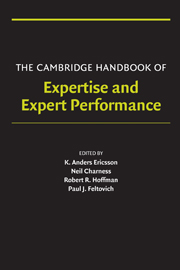Book contents
- Frontmatter
- Contents
- Acknowledgments
- Contributors
- PART I INTRODUCTION AND PERSPECTIVE
- PART II OVERVIEW OF APPROACHES TO THE STUDY OF EXPERTISE – BRIEF HISTORICAL ACCOUNTS OF THEORIES AND METHODS
- PART III METHODS FOR STUDYING THE STRUCTURE OF EXPERTISE
- PART IV METHODS FOR STUDYING THE ACQUISITION AND MAINTENANCE OF EXPERTISE
- PART V DOMAINS OF EXPERTISE
- PART VI GENERALIZABLE MECHANISMS MEDIATING EXPERTISE AND GENERAL ISSUES
- 34 A Merging Theory of Expertise and Intelligence
- 35 Tacit Knowledge, Practical Intelligence, and Expertise
- 36 Expertise and Situation Awareness
- 37 Brain Changes in the Development of Expertise: Neuroanatomical and Neurophysiological Evidence about Skill-Based Adaptations
- 38 The Influence of Experience and Deliberate Practice on the Development of Superior Expert Performance
- 39 Development and Adaptation of Expertise: The Role of Self-Regulatory Processes and Beliefs
- 40 Aging and Expertise
- 41 Social and Sociological Factors in the Development of Expertise
- 42 Modes of Expertise in Creative Thinking: Evidence from Case Studies
- Author Index
- Subject Index
- References
38 - The Influence of Experience and Deliberate Practice on the Development of Superior Expert Performance
from PART VI - GENERALIZABLE MECHANISMS MEDIATING EXPERTISE AND GENERAL ISSUES
- Frontmatter
- Contents
- Acknowledgments
- Contributors
- PART I INTRODUCTION AND PERSPECTIVE
- PART II OVERVIEW OF APPROACHES TO THE STUDY OF EXPERTISE – BRIEF HISTORICAL ACCOUNTS OF THEORIES AND METHODS
- PART III METHODS FOR STUDYING THE STRUCTURE OF EXPERTISE
- PART IV METHODS FOR STUDYING THE ACQUISITION AND MAINTENANCE OF EXPERTISE
- PART V DOMAINS OF EXPERTISE
- PART VI GENERALIZABLE MECHANISMS MEDIATING EXPERTISE AND GENERAL ISSUES
- 34 A Merging Theory of Expertise and Intelligence
- 35 Tacit Knowledge, Practical Intelligence, and Expertise
- 36 Expertise and Situation Awareness
- 37 Brain Changes in the Development of Expertise: Neuroanatomical and Neurophysiological Evidence about Skill-Based Adaptations
- 38 The Influence of Experience and Deliberate Practice on the Development of Superior Expert Performance
- 39 Development and Adaptation of Expertise: The Role of Self-Regulatory Processes and Beliefs
- 40 Aging and Expertise
- 41 Social and Sociological Factors in the Development of Expertise
- 42 Modes of Expertise in Creative Thinking: Evidence from Case Studies
- Author Index
- Subject Index
- References
Summary
There are several factors that influence the level of professional achievement. First and foremost, extensive experience of activities in a domain is necessary to reach very high levels of performance. Extensive experience in a domain does not, however, invariably lead to expert levels of achievement. When individuals are first introduced to a professional domain after completing their basic training and formal education, they often work as apprentices and are supervised by more-experienced professionals as they accomplish their work-related responsibilities. After months of experience, they typically attain an acceptable level of proficiency, and with longer experience, often years, they are able to work as independent professionals. At that time most professionals reach a stable, average level of performance, and then they maintain this pedestrian level for the rest of their careers. In contrast, some continue to improve and eventually reach the highest levels of professional mastery.
Traditionally, individual differences in the performance of professionals have been explained by an account given by Galton (1869/1979, see Ericsson, 2003a, for a description). According to this view, every healthy person will improve initially through experience, but these improvements are eventually limited by innate factors that cannot be changed through training; hence attainable performance is constrained by one's basic endowments, such as abilities, mental capacities, and innate talents. This general view also explains age-related declines in professional achievement, owing to the inevitable degradation of general capacities and processes with age (see also Krampe & Charness, Chapter 40).
- Type
- Chapter
- Information
- The Cambridge Handbook of Expertise and Expert Performance , pp. 683 - 704Publisher: Cambridge University PressPrint publication year: 2006
References
- 639
- Cited by

